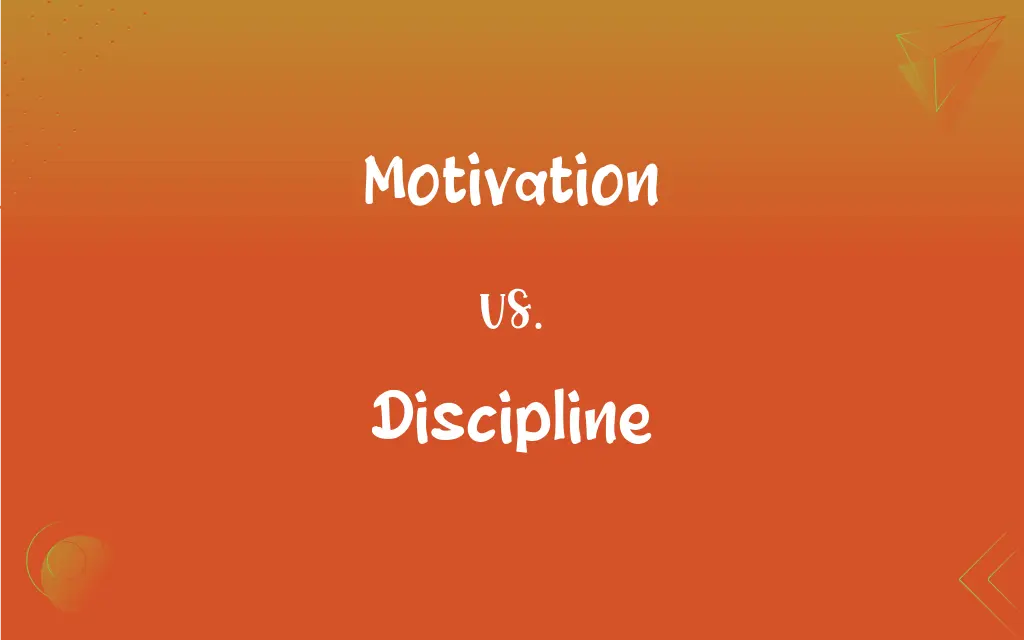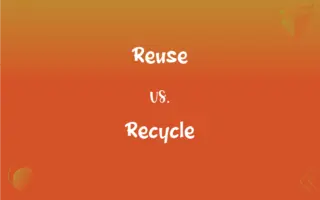Motivation vs. Discipline: What's the Difference?
Edited by Aimie Carlson || By Harlon Moss || Published on November 14, 2023
Motivation is the inner drive pushing one to act; discipline is the practice of training oneself to follow rules or a code of behavior.

Key Differences
Motivation refers to the psychological forces or reasons that incite an individual to act, move, or behave in a certain manner. It's the inner drive or desire that fuels one's actions toward achieving a particular goal. On the other hand, discipline encompasses the structured practices or habits an individual cultivates to maintain consistent action, even when motivation wanes. Discipline is the force that keeps one going when the initial spark of motivation starts to diminish.
At the core of motivation lies the 'why' behind one's actions. This can stem from various sources, including personal desires, external rewards, or inherent enjoyment. Discipline, however, isn't about the 'why'; it's about the 'how'. It's the commitment and consistency in following a set routine or behavior, regardless of one's momentary feelings or inclinations.
While motivation can be seen as a temporary state, often fluctuating based on emotions or circumstances, discipline is more enduring. It's the steady hand that guides one's actions, even when motivation might be low. While motivation provides the initial push or inspiration to start something, discipline ensures the continuity and completion of the task.
One can argue that motivation is more about passion, while discipline pertains to perseverance. A person might be motivated to start a new project because of excitement or interest, but it's discipline that will see the project through to its conclusion. Both elements are crucial for success, with motivation serving as the starting ignition and discipline acting as the sustained engine.
Comparison Chart
Nature
Psychological force or reason.
Structured practices or habits.
ADVERTISEMENT
Focus
The 'why' behind actions.
The 'how' of consistent action.
Duration
Often temporary and fluctuating.
More enduring and stable.
Source
Can stem from internal or external factors.
Self-imposed practices or rules.
Role in Action
Provides the initial push or spark.
Ensures continuity and consistency.
Motivation and Discipline Definitions
Motivation
A psychological force pushing one towards a goal.
Financial rewards provided the motivation for her overtime work.
ADVERTISEMENT
Discipline
The act of developing self-control or habits.
Discipline in savings helped her amass a substantial nest egg.
Motivation
The emotional or logical stimulus behind an action.
The applause from the audience was all the motivation he needed.
Discipline
The practice of training oneself to follow a code.
Daily meditation became a discipline he wouldn't skip.
Motivation
The enthusiasm or interest propelling one forward.
His motivation to learn never waned, even in his later years.
Discipline
Consistency in behavior despite challenges.
Through discipline, she maintained her exercise regimen rain or shine.
Motivation
The inner drive that prompts action.
His love for art was his main motivation to become a painter.
Discipline
A system of rules guiding one's actions.
He followed a strict discipline in his dietary choices.
Motivation
The reasons or desires leading to behavior.
Personal growth was her motivation behind the rigorous training.
Discipline
Maintaining order and consistency through self-imposed practices.
His writing discipline ensured he completed a chapter every week.
Motivation
The act or process of motivating
The coach's effective motivation of her players.
Discipline
Training expected to produce a specific character or pattern of behavior, especially training that produces moral or mental improvement
Was raised in the strictest discipline.
Motivation
The state of being motivated; having a desire or willingness to act
Students with a high level of motivation.
Discipline
Control obtained by enforcing compliance or order
Military discipline.
Motivation
Something that motivates; an inducement, reason, or goal
“If your primary motivation in life is to be moral, you don't become an artist” (Mary Gordon).
Discipline
Controlled behavior resulting from disciplinary training; self-control
Dieting takes a lot of discipline.
FAQs
How does discipline affect productivity?
Discipline ensures consistent action, enhancing productivity especially when motivation wanes.
How does discipline relate to habits?
Discipline involves cultivating and maintaining consistent habits, even when faced with challenges.
Can motivation be externally imposed?
While external factors can influence motivation, the true force comes from within.
Is motivation always positive?
Not necessarily; motivation can stem from positive aspirations or fear-based incentives.
How can one boost motivation?
Setting clear goals, seeking inspiration, and visualizing positive outcomes can help.
Are motivation and discipline mutually exclusive?
No, they often complement each other. Motivation provides the spark, while discipline ensures the flame keeps burning.
What's a common source of motivation for athletes?
Achieving personal bests or winning championships can be strong motivators.
How can one cultivate discipline?
Setting clear goals, creating routines, and practicing self-accountability can foster discipline.
Is discipline always self-imposed?
Often, but external structures (like rules or mentors) can also guide and instill discipline.
Can discipline be developed over time?
Yes, discipline is often cultivated through repeated practice and consistency.
Why is discipline important in learning?
Discipline ensures consistent effort and practice, crucial for mastering new skills.
Why is discipline vital in professional settings?
Discipline ensures tasks are completed consistently and standards are maintained.
What drives motivation?
Motivation can be driven by internal desires or external rewards.
Is discipline rigid and inflexible?
While discipline emphasizes consistency, it can be adapted based on one's goals and circumstances.
What role does discipline play in success?
Discipline ensures perseverance, making it a key ingredient for long-term success.
Can motivation be learned or is it innate?
While some have innate drives, motivation can be cultivated and nurtured over time.
Can a lack of motivation be temporary?
Yes, motivational dips are natural and can be influenced by various factors.
Can motivation wane over time?
Yes, motivation can fluctuate based on emotions, circumstances, or achieved goals.
How does discipline relate to self-control?
Discipline involves exerting self-control to maintain consistency in actions or habits.
Can external factors boost motivation?
Yes, factors like rewards, recognition, or peer support can enhance motivation.
About Author
Written by
Harlon MossHarlon is a seasoned quality moderator and accomplished content writer for Difference Wiki. An alumnus of the prestigious University of California, he earned his degree in Computer Science. Leveraging his academic background, Harlon brings a meticulous and informed perspective to his work, ensuring content accuracy and excellence.
Edited by
Aimie CarlsonAimie Carlson, holding a master's degree in English literature, is a fervent English language enthusiast. She lends her writing talents to Difference Wiki, a prominent website that specializes in comparisons, offering readers insightful analyses that both captivate and inform.































































